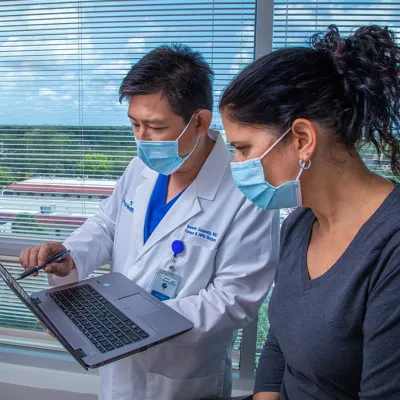- AdventHealth Digestive Health Institute Tampa
Choose the health content that’s right for you, and get it delivered right in your inbox.
Colorectal cancer is the third most common cancer diagnosed in men and women in the United States. And while colorectal cancer is most common in individuals over 50, rates of colorectal cancer are rising among people younger than age 50 – and experts aren’t quite sure why.
Discover why it’s important to follow your provider’s recommended colorectal screening advice.
When should I start colorectal cancer screenings?
Experts agree you should start having colonoscopies by age 45 to detect signs of colorectal cancer. However, if you have a family history of colorectal cancer, polyps or other risk factors, you may need to start sooner. Your primary care provider can offer advice tailored to your risks, or you can talk to a gastroenterologist.
What is the best colorectal cancer screening?
The gold standard for detecting early signs of colorectal cancer is a colonoscopy. Home tests may be tempting, but these can’t always identify signs of cancer. Most home tests only look for blood or altered DNA in a stool sample. These tests don’t detect polyps in the colon, which can increase your risk of developing colorectal cancer. For a detailed comparison of screening tests, see the back side of this sheet.
Do I have to complete the bowel prep before my colonoscopy?
Yes. Your provider needs to have a clear view of your colon to check for polyps or cancerous growths. The bowel prep may not be anyone’s favorite part of the colonoscopy, but it’s only a few hours of unpleasantness. And the tradeoff is clear – it may just save your life.
Colorectal Cancer Screening Tests: Know the Difference.
Guaiac-Based Fecal Occult Blood Test (gFOBT)
With this test, you collect a small sample of stool at home to send back to a lab, where a test checks for blood in your stool.
Can it detect colorectal cancer? No.
Fecal Immunochemical Test (FIT)
Similar to the guaiac-based test, you will collect a small sample of stool at home to send back to the lab. The lab will check for blood in the stool.
Can it detect colorectal cancer? No.
FIT-DNA Test
This type of test checks for blood in the stool as well as altered DNA in the sample. You send an entire bowel movement to the lab from your home.
Can it detect colorectal cancer? No.
Flexible Sigmoidoscopy
Completed as an outpatient procedure, a flexible sigmoidoscopy checks for polyps or cancer in the rectum and lower third of the colon. You’ll need to prepare by cleaning out your bowels.
Can it detect colorectal cancer? Yes.
Colonoscopy
The gold standard for detecting colorectal cancer (and its early signs), a colonoscopy allows your provider to check for polyps or cancerous growths along your entire colon. You’ll need to clean out your bowels before the procedure.
Can it detect colorectal cancer? Yes.
Take control of your health. Schedule your colonoscopy today.
To make an appointment, please call Call844-200-3336



